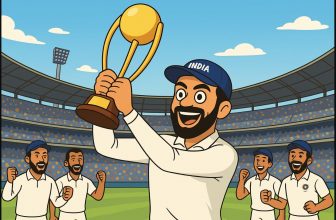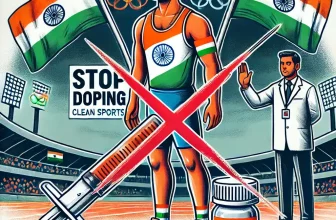Indian cricketers are not only known for their exceptional skills on the field but also for their commitment to their nation off it. Over the years, several cricketers have been honored with prestigious government positions, showcasing their dedication to serving the country beyond just sports. These appointments highlight how athletes contribute to society in multiple ways.
Here’s a look at 8 Indian cricketers who have secured government jobs, leading dual careers with pride and responsibility.
1. MS Dhoni – Lieutenant Colonel, Indian Territorial Army
MS Dhoni, one of the most successful and iconic captains in Indian cricket history, has made significant contributions both on and off the field. After leading India to victory in major tournaments like the ICC T20 World Cup, ICC World Cup, and ICC Champions Trophy, Dhoni’s leadership qualities were further recognized when he was appointed as an honorary Lieutenant Colonel in the Indian Territorial Army in 2011.
This honorary title was a testament to Dhoni’s dedication to serving his country. He has always been vocal about his respect for the armed forces, and this recognition highlights his deep sense of patriotism. As a Lieutenant Colonel, Dhoni’s commitment to national service was solidified, and it also serves as an inspiration for other athletes to follow suit.
2. KL Rahul – Assistant Manager, Reserve Bank of India (RBI)
KL Rahul, known for his stylish batting and versatility, took a different path post his cricket career. In 2018, Rahul was appointed as an Assistant Manager at the Reserve Bank of India under the sports quota. His selection was based not only on his cricketing achievements but also on his academic background in commerce.
This role showcases how athletes, like Rahul, can bring their skills to the professional sector. It is a great example of how cricketers can juggle multiple careers, excelling in sports while also contributing to India’s financial ecosystem.
3. Sachin Tendulkar – Group Captain, Indian Air Force
No list of legendary cricketers is complete without Sachin Tendulkar. The “Master Blaster” is not only a cricketing icon but also a national hero who holds a prestigious position in the Indian Air Force. In 2010, Tendulkar was awarded the honorary rank of Group Captain in the Indian Air Force.
This recognition was in honor of his contributions to Indian cricket and his status as one of the most celebrated athletes in the world. Tendulkar’s appointment as Group Captain further emphasizes his extraordinary connection with his nation, and it serves as a reminder of the honor and respect athletes like him enjoy.
4. Kapil Dev – Lieutenant Colonel, Indian Territorial Army
Kapil Dev, who led India to its first-ever World Cup victory in 1983, was appointed as an honorary Lieutenant Colonel in the Indian Territorial Army in 2008. Kapil Dev’s remarkable career as a cricketer, combined with his leadership qualities, made him a natural choice for this position.
His appointment was not just about his cricketing success but also about his deep sense of patriotism and the desire to serve his country in another meaningful way. Kapil Dev’s legacy continues to inspire generations of athletes who look to balance their sporting careers with contributions to public service.
5. Yuzvendra Chahal – Inspector, Income Tax Department
Yuzvendra Chahal, known for his brilliant leg-spin and sharp cricketing mind, was appointed as an Income Tax Inspector in Haryana in 2018. Chahal’s selection was part of the state’s initiative to employ sportspersons under the sports quota. This appointment is a recognition of his sporting achievements and his ability to excel in other professional fields.
Chahal’s appointment also highlights the growing trend of cricketers securing government jobs post their playing careers, offering them a platform to contribute to public service while still being involved in cricket.
6. Harbhajan Singh – Deputy Superintendent of Police (DSP), Punjab
Harbhajan Singh, one of India’s greatest off-spinners, was appointed as a Deputy Superintendent of Police (DSP) in Punjab. His appointment in 2009 was part of the state’s program to provide government positions to athletes who have made significant contributions to their respective fields.
Harbhajan’s career as a cricketer is well-known, and his transition to a government role speaks to the growing recognition of athletes’ contributions to society. His position as DSP also underscores the value of leadership and discipline, qualities that Harbhajan exemplifies both on and off the field.
7. Joginder Sharma – Deputy Superintendent of Police (DSP), Haryana
Joginder Sharma, remembered for his match-winning performance in the 2007 ICC T20 World Cup final, was appointed as a Deputy Superintendent of Police (DSP) in Haryana in 2018. This role came after his successful cricket career, where he played a key role in India’s historic World Cup victory.
Sharma’s appointment highlights the increasing trend of athletes transitioning into law enforcement roles, further showcasing the diverse ways in which cricketers contribute to society.
8. Mohammad Siraj – Deputy Superintendent of Police (DSP), Telangana
Fast bowler Mohammad Siraj, who has made his mark with stellar performances in Test cricket, was appointed as Deputy Superintendent of Police (DSP) in Telangana. Siraj’s appointment reflects the state’s initiative to honor sportspersons with government positions and to provide them a platform to serve the community.
This recognition is not just about his cricketing skills, but also about his potential to serve and contribute to law enforcement. Siraj’s role as DSP will allow him to utilize the leadership and discipline learned on the cricket field in his work within the police department.
Conclusion – 8 Cricketers Making a Difference Off the Field
These 8 Indian cricketers have proven that their contributions to the nation extend far beyond cricket. From positions in the Indian Army to law enforcement and government financial institutions, these cricketers are serving India in multiple capacities. Their appointments not only honor their sporting achievements but also highlight the importance of athletes contributing to public service.
Their stories emphasize the value of leadership, discipline, and service, qualities that extend beyond cricket and play a vital role in shaping the country’s future. These cricketers are not just sports icons but also public servants who continue to make a difference off the field, leaving a legacy that transcends their achievements in the game.





